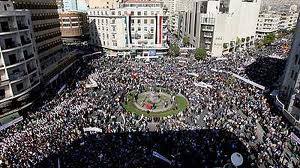 Image credit: SkyNews
Image credit: SkyNews
"We are extremely concerned that lives are endangered as a result of this article based on WikiLeaks," a senior Obama administration official told Fox News Monday morning. "The concern regards what (the) Syrians might do to those that work for (Barada), given that (Assad and his security forces) are prone to crack down and could well use this as an excuse -- blaming it on foreigners."
It is unfortunate that it took a Washington Post article on US involvement in Syria for the US government to feel concern, and that it chose to do so based on the disclosure of their actions rather than the actions. US State cables published by the Washington Post have illustrated reason for concern over US involvement for a very long time, and have also shown that US actions have been known to the Syrian government for a very long time.
Cable 09DAMASCUS306 dated April 28, 2009 states: "The SARG would undoubtedly view any U.S. funds going to illegal political groups as tantamount to supporting regime change. This would inevitably include the various expatriate reform organizations operating in Europe and the U.S., most of which have little to no effect on civil society or human rights in Syria."
As related in cable 09DAMASCUS477 dated July 8, 2009, it did not take the publication of the US State cables for the Syrian government to become aware of US activity. "... report begs the question of how much and for how long SARG has known about Democracy Council operations in Syria and, by extension, the MJD's participation. Reporting in other channels suggest the Syrian Muhubarat may already have penetrated the MJD and is using MJD contacts to track U.S. democracy programming. If the SARG does know, but has chosen not to intervene openly, it raises the possibility that the SARG may be mounting a campaign to entrap democracy activists receiving illegal (under Syrian law) foreign assistance."
From cable 09DAMASCUS692 dated September 23, 2009: "It is unclear to what extent SARG intelligence services understand how USG money enters Syria and through which proxy organizations. What is clear, however, is that security agents are increasingly focused on this issue when they interrogate human rights and civil society activists."
Much earlier, cable 06DAMASCUS701 dated February 21, 2006 describes the reaction of Syrian opposition groups to a public announcement by the US that it had designated five million US dollars for the Syrian opposition. The embassy was told at that time that such actions could be very harmful to the opposition's efforts, and that the human rights and civil society activists were left with the impression that the US government saw them as just another "chip in the game" and were not serious about helping them. The US government was perceived as either naive or uncaring. It was also pointed out that anyone visiting the website the US government had set up for the program would instantly be targeted by the Syrian government. Accepting foreign funding is illegal in Syria, and anyone caught would be accused of treason and face the death penalty.
The most likely applicants for the funding, according to the embassy contacts, were the Syrian government themselves. One contact described the funding as a terrible idea that would be used by the regime to discredit the opposition and had already made the opposition look like US agents in the eyes of "most Syrians" even with no government effort. The US was told that funding would help the Syrian regime consolidate its position. One dismissed it as a stunt with a small amount of money that would make no impact (as previous US funding of the opposition had made no impact) and said that it had angered most Syrians who resented the US interference in their affairs. It was also pointed out that, for the damage caused, five million dollars was a very low amount compared to the 75 million pledged to the Iranian opposition.
Today US State Department spokesman Mark Toner said the US was not working to undermine the Syrian government, but rather to "promote a transformation to a more democratic process." The first half of that strategy is working excellently well, as US involvement has contributed more than any other factor to keeping Assad in power and attracting suspicion to any dissidents. But promoting democracy requires a better understanding of what democracy actually is. In the US, where the last "democratic" election cost an estimated US$5.3 billion, the basic premise of a democracy as an indication of the free will of the citizens has been lost and is now equated with money spent.
The Iranian Foreign Ministry today denied US accusations of Iranian assistance to Assad, saying “We deny these claims and we are sure that the Syrian government is able to resolve the internal problems and respond appropriately to people’s demands.”
The Syrian government has very effectively cast doubt and suspicion on the identity, motivations and backing of the Syrians protesting this year. Even the snipers shooting people have had their identity questioned. If the US government was using its embassy to undermine the credibility of Assad's opposition, they have done a very good job. The list of people imprisoned, missing and killed since the protests began is now at 925, as what ought to be a straightforward matter of removing a corrupt and sadistic government has become a game of propaganda and suspicion with no one ever sure who they are fighting against or beside.
Previous WL Central coverage on Syria.
Theme by Danetsoft and Danang Probo Sayekti inspired by Maksimer